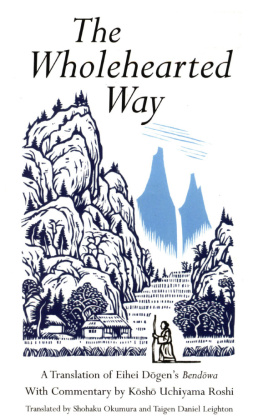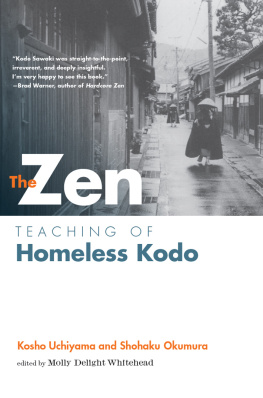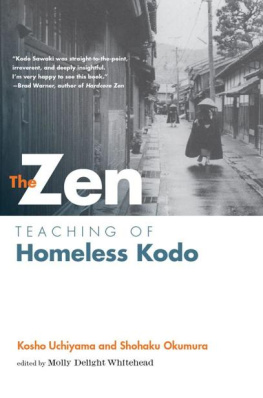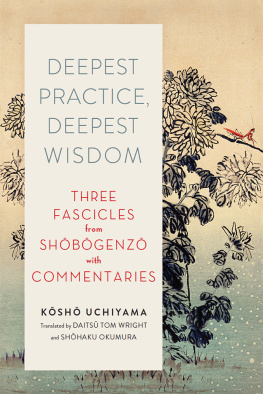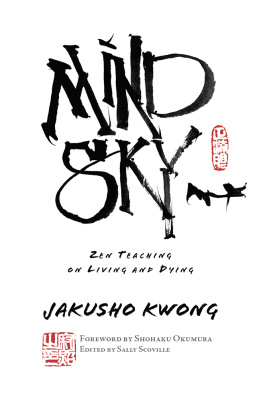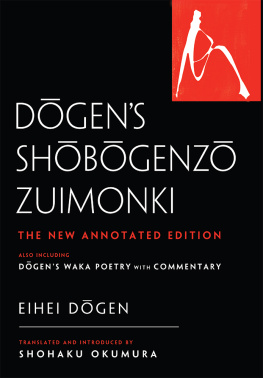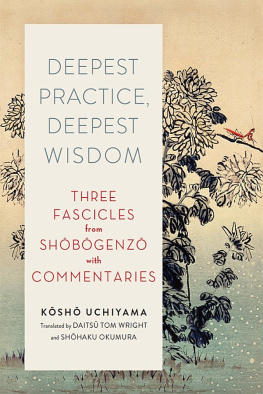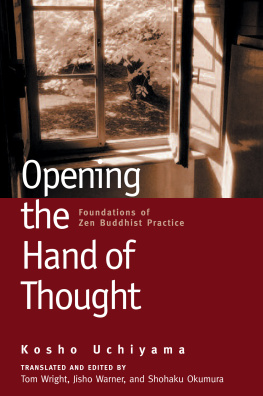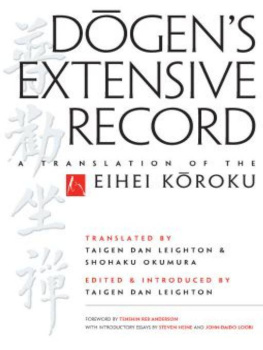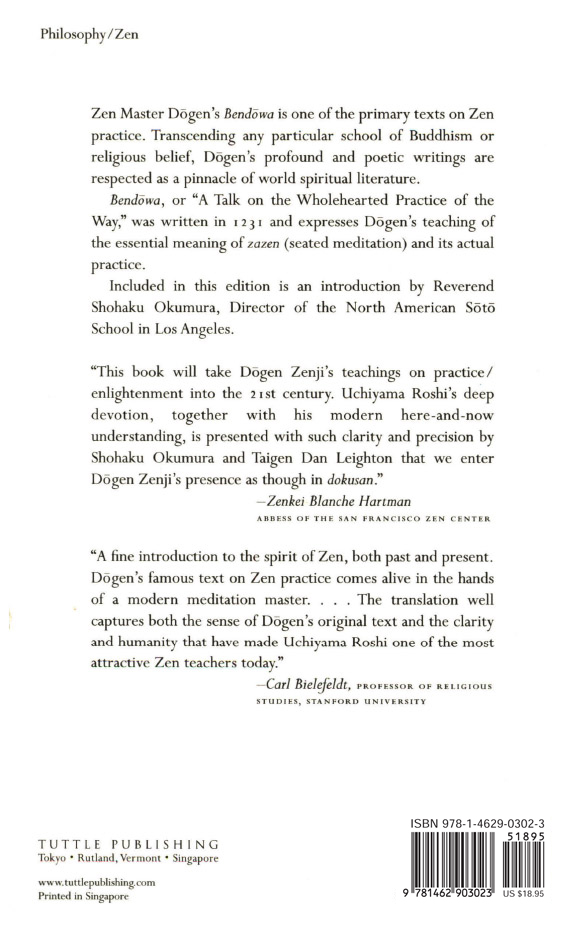First published in 1997 by Tuttle Publishing, an imprint of Periplus Editions (HK) Ltd., with editorial offices at 364 Innovation Drive, North Clarendon, Vermont 05759 U.S.A. and at 61 Tai Seng Avenue #02-12, Singapore 534167.
Copyright 1997 Shohaku Okumura and Taigen Dan Leighton
Ail rights reserved. No part of this publication may be reproduced or utilized in any form or by any means, electronic or mechanical, including photocopying, recording, or by any information storage and retrieval system, without prior written permission from the publisher.
Library of Congress Catalog Card Number: 97-61460
ISBN: 978-1-4629-0302-3 (ebook)
Distributed by:
| North America, Latin America and Europe | Asia Pacific |
| Tuttle Publishing | Berkeley Books Pte. Ltd. |
| 364 Innovation Drive | 61 Tai Seng Avenue #02-12, |
| North Clarendon, VT 05759-9436 | Singapore 534167. |
| Tel: I (802) 773 8930 | Tel: (65) 6280 1330 |
| Fax: I (802) 773 6993 | Fax: (65) 6280 6290 |
| Email: info@tuttlepublishing.com | Email: inquiries@periplus.com.sg |
| Web site: www.tuttlepublishing.com | Web site: www.periplus.com
|
| Japan | Indonesia |
| Tuttle Publishing | PTJava Books Indonesia |
| Yaekari Building, 3rd Floor | Kawasan Industri Pulogadung |
| 5-4-12 saki. Shinagawa-ku, Tokyo | JI. Rawa Gelam IV No. 9 |
| Japan 141-0032 | Jakarta 13930, Indonesia |
| Tel: (81) 3 5437 0171 | Tel: (62-21) 4682 1088 |
| Fax: (81) 3 5437 0755 | Fax: (62-21) 461 0206 |
| Email: tuttle-sales@gol.com | Email: cs@javabooks.co.id
|
First edition
15 14 13 12 11 10 11 10 9 8 7 6 5
Printed in Singapore
TUTTLE PUBLISHING is a registered trademark of Tuttle Publishing, a division of Periplus Editions (HK) Led.


Foreword
B endwa (Talk on wholehearted practice of the way) is one of the primary writings about practice/enlightenment by the great Japanese Zen Master Eihei Dgen (1200-1253). After training as a monk in the dominant Japanese Tendai school and studying with the early Japanese Rinzai Zen teachers, Dgen was dissatisfied with the Japanese Buddhist teachings of his time, and in 1223 went to study in China. After meeting his teacher and receiving dharma transmission, Dgen returned to Japan in 1227. He eventually spread his teachings about Zen meditation and practice, and established a monastery to maintain this tradition. Dgen is now honored as the founder of the St branch of Japanese Zen, which remains strong in Japan and in recent decades has spread in many places in the West.
Above and beyond any particular school of Buddhism or religious affiliation, Dgen's profound and poetic writings are now generally respected as a pinnacle of Japanese philosophy and of world spiritual literature. Among Zen masters, Dgen was a uniquely prolific writer. Especially renowned is his long masterwork, the collection of essays Shbgenz (True dharma eye treasury), some versions of which include Bendwa.
Bendwa was written in 1231, soon after Dgen's return from China to Japan. In this essay Dgen expresses his teaching of the essential meaning of zazen (seated meditation) and its actual practice, elaborating on his brief initial writing, Fukanzazengi (The way of zazen recommended to everyone). Much of Dgen's teaching encourages wholehearted engagement in our lives, based on awakening to our intimate interconnectedness with the totality of our world and its creatures. Our intention in presenting this translation and commentary on Bendwa is to make it available for the use and benefit of practitioners and sincere students interested in this profound, spiritual way of life recommended by Dgen Zenji.
We have added notes to the end of the translation of the text to elucidate technical terms and Dgen's references to the Buddhist and East Asian cultural traditions. Shhaku Okumura Sensei's introduction provides valuable background on the place of Bendwa in Dgen's writings, as well as on some of the important developments in the Japanese St Zen tradition after Dgen, of which very little has been available up to now in English. The introduction also discusses the essential meaning and etymology of "practice of the way" and of Dgen's fundamental teaching of jijuy zanmai, the samadhi of self-fulfillment, which is elucidated in Bendwa.
This book also features the lively and direct commentary of Ksh Uchiyama Roshi, Okumura Sensei's teacher, who is one of the most highly respected modern Japanese St Zen masters. Some fine English translations from Dgen's writings have appeared, and a few insightful scholarly treatments of Dgen's teachings have been published in English; still, it is unusual to find a practical commentary like Uchiyama Roshi's, which expresses the down-to-earth implications of this subtle teaching for our everyday actualization. Uchiyama Roshi was successor to the great, dynamic Japanese master, Kd Sawaki Roshi, who revitalized the practice of zazen in modern Japan before his death in 1965. From 1965 until his retirement in 1975, Uchiyama Roshi was abbot of Antaiji monastery, then in Kyoto, which was a primary place for Westerners to practice Zen in Japan during those years. He now lives with his wife in a small temple outside Kyoto and continues to practice the Japanese art of origami, of which he is also a master. Uchiyama Roshi has written many Zen texts and commentaries, some of which have been translated into English in Refining Your Life and Opening the Hand of Thought. We hope Western practitioners will savor this commentary on Bendwa, selected from Uchiyama Roshi's talks to Zen students at Ssenji Temple in Kyoto in 1978 and 1979.

